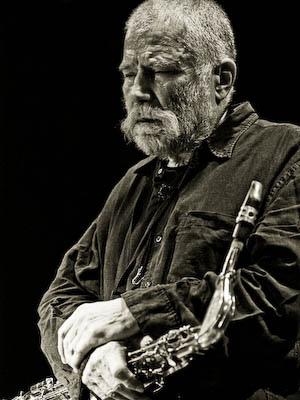

A lineup was almost instantly produced, calls were made, and suddenly a new band was formed. Preparing for a Brotz visit in January, '97, I suggested that he come for a little longer than usual and that we put together, rehearse and record something different, maybe a larger group along the lines of his legendary octet. The experience left a very positive impression, plans for future collaboration were quickly exchanged, and a special relationship between Brötzmann and Chicago was deepened. Brötzmann had already made Chicagoan Hamid Drake a long-term partner, but the weekend gave him a bird's eye on other facets of the city's active scene he played with Drake and Michael Zerang in an off-site concert at Lunar Cabaret, saw the NRG Ensemble rip through a set at the now-defunct Bop Shop, and enjoyed a brief, white-hot duet with Mars Williams so promising that it obliged a follow-up.
#The peter brotzmann octet series#
Nobody really knew it at the time, but the idea for the music on these three discs was spawned at the FMP Festival (official title: A Salute to Free Music Production) in 1995, a one-off event that brought ten major European improvisers (plus Shelley Hirsch from New York) to the Windy City for a three day series of concerts. Ware in the sax section, but the vast majority of his American tours including half a dozen or so visits to Chicago have been with compact, fiscally feasible outfits.

more frequently early in that decade, there were virtually no possibilities for larger ensembles once, in 1984, he led a big New York group through his piece -Alarm- with Charles Gayle, Frank Wright, Jemeel Moondoc, and David S. But the self-evident truth is that as a band gets bigger it becomes much more expensive to book and logistics become more difficult to coordinate the threadbare '80s forced Brötzmann most often to hunker down with his other preferred setting of trio-with-drummer or similarly economical groupings. That format didn't exactly vanish from the Brotz-oeuvre, over the last 20 years on record alone there's the nine-piece Alarm group of 1981, the eleven-piece clarinet project of '84 and the MSrz Combo tentet of '92. Indeed, the notion of marshaling free music's tensile strength forces into a concise, dynamic action-jazz ensemble is arguably one of his most far-reaching visions. Quicker and more concentrated than a creative orchestra (with which Brötzmann had already had plenty of experience, dating back to the earliest Globe Unity date in 1966), with a knockout punch more devastating than any small combo and range greater than a duo or trio, these upper-midsize bands were the perfect vehicle for Brötzmann's forays into the nexus of power and sound. Different groups featured an international cast, including many of the key figures of the British, Dutch, German, Belgian and Swiss scenes. In the first decade of European improvised music, his octets, nonets and tentets stormed the stage at festivals like the Holy Hill Jazz Meeting in Heidelberg (1969) and the German Jazz Festival in Frankfurt (1970). Machine Gun, which took its name from Don Cherry's succinct description of Brötzmann, was the opening declaration of the Wuppertalian saxophonist's love of bigger bands.

Over thirty years ago, in May 1968, Peter Brötzmann made a watershed octet recording for his own record label amid the heat of the student uprising in the left-wing leaning city of Bremen. Concert by the Peter Brötzmann Tentet featuring: Peter Brötzmann (tenor sax, clarinets, tarrogato) Mats Gustafsson (tenor, baritone sax) Ken Vandermark (tenor sax, clarinets) Mars Williams (soprano, alto, tenor sax) Joe McPhee (trumpet, valve trombone, soprano sax) Jeb Bishop (trombone) Fred Lonberg-Holm (cello) Kent Kessler (contrabass) Hamid Drake (drums, percussion) Michael Zerang (drums, percussion)


 0 kommentar(er)
0 kommentar(er)
